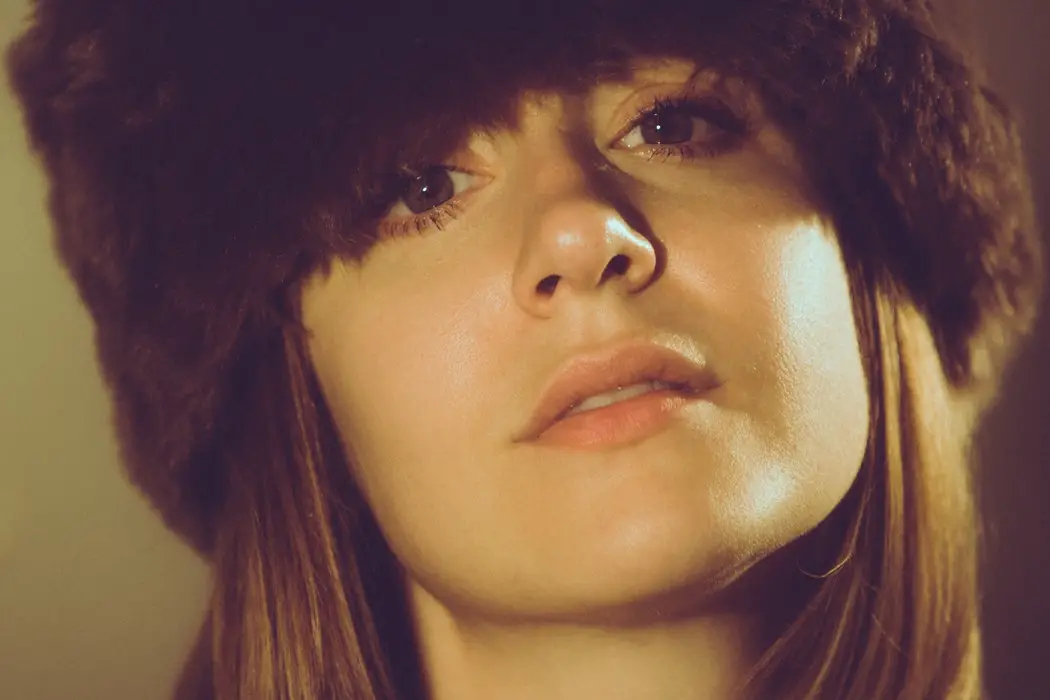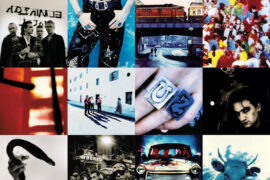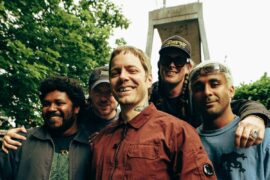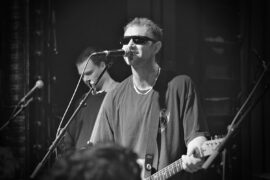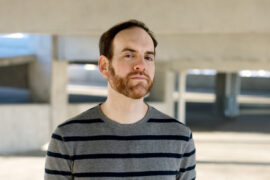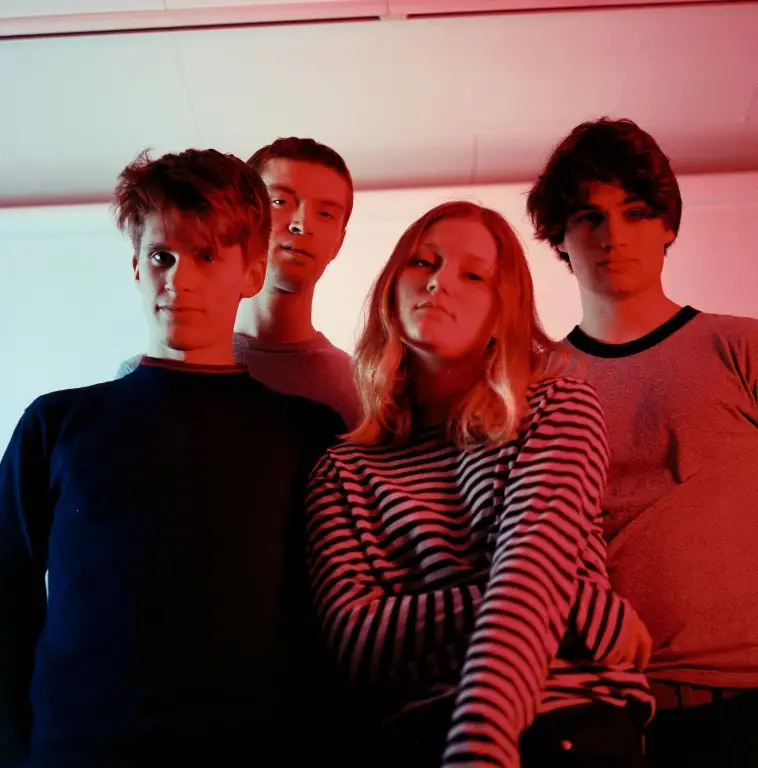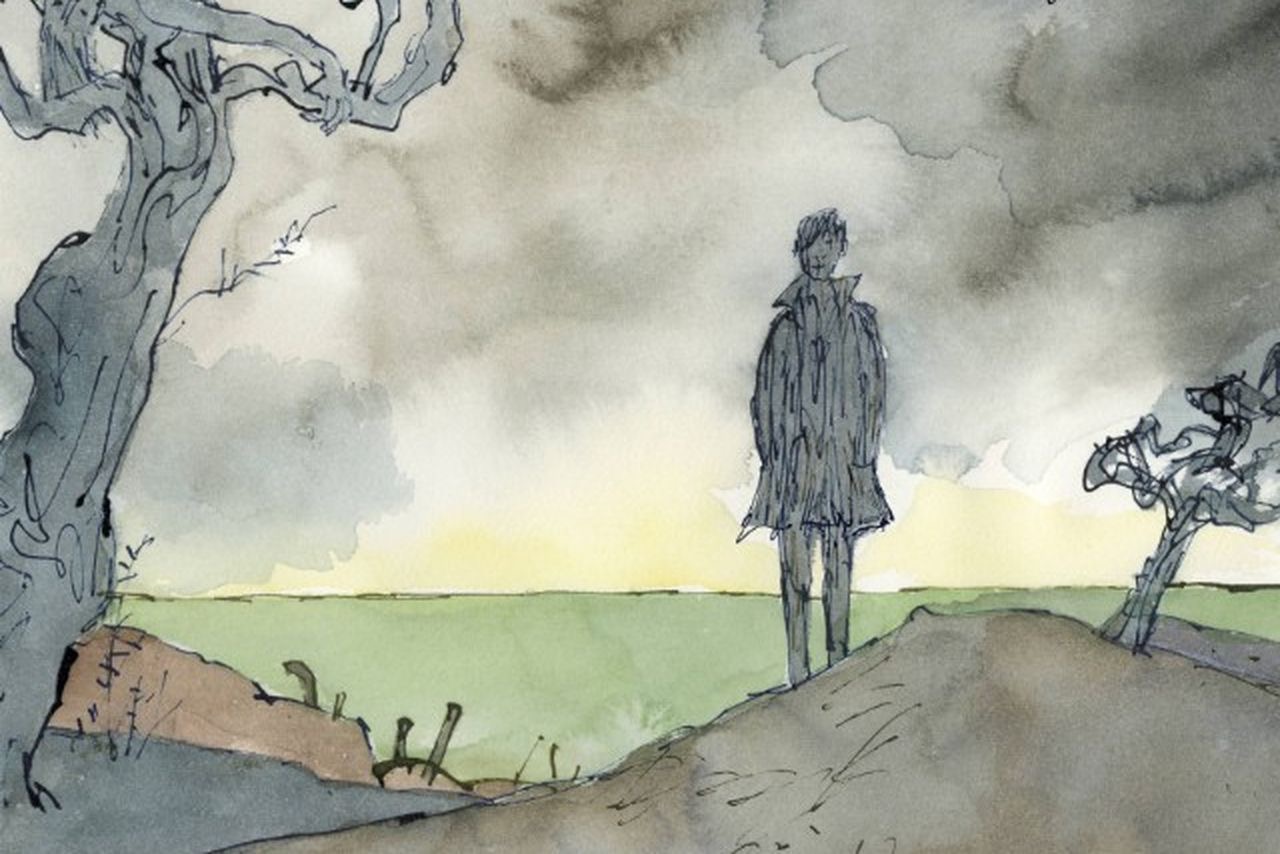Atwood Magazine speaks to singer/songwriter Laura Stevenson, touching on her come-up in DIY scenes, reckoning with family and self-harm, new album ‘The Big Freeze’, and the internal rhyme schemes of the Notorious B.I.G.
— —
Laura Stevenson is the kind of songwriter that lives in your heart.
It’s impossible to come away from one of her four records or a live show not feeling closer to her somehow – her voice is beckoning and sweet, it aches and it pulls. Her lyrics are everything you want them to be: poetic and beautiful, but perfectly simple when they need to be.
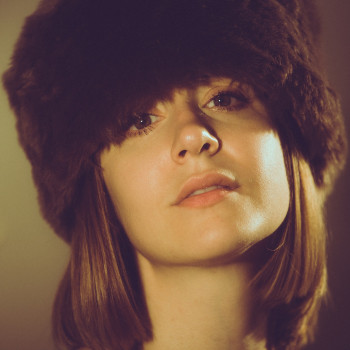
On her new record, The Big Freeze (out March 29 via Don Giovanni Records), Stevenson deftly pulls together all her prior work, in addition to a self-proclaimed new level of honesty. The record is dark, discussing self-harm and a self-reckoning, but moments of clarity and hopefulness often burble through, most fervently so on the album’s opening track, “Lay Back, Arms Out.” There is catharsis everywhere, in the gut-wrenching tempo of “Low Slow” and the acoustic shimmer of “Perfect.”
The record sparkles and it casts shadows, due in part to the gorgeously intimate way it was recorded. Done entirely in Stevenson’s childhood home in New York, it feels like a new way of hearing the singer/songwriter, who has often moved fluidly through varying genres, surrounded by a group of dedicated musicians. Here, she says she based each song on its performance, meaning the focal point is just herself and her guitar. There is lush instrumentation, with strings and horns, and the vocal production is often cavernous, but the intimacy achieved in these ten songs is staggering.
It’s difficult to compare Stevenson to anyone, because as a recent Stereogum feature pointed out, she’s been ahead of the curve. The Big Freeze is a luminous record, sure to make a permanent home for itself in your heart.
Atwood Magazine spoke to Laura Stevenson ahead of The Big Freeze’s release to discuss her career and the making of a beautiful record.
Stream Laura Stevenson:
A CONVERSATION WITH LAURA STEVENSON
Atwood Magazine: Thank you so much for taking the time to do this! I have to be a huge nerd and tell you that this is so cool for me.
Laura Stevenson: Aw, thank you so much!
The first time I saw you was in this little record store in Chinatown in Chicago – it was you and Jeff Rosenstock, I think.
Stevenson: Oh, yeah!
I was just reminiscing about it with my friends. I love your new record so much; it’s beautiful. I want to discuss the record, as well as some larger contextual things. To start, can you tell me a little about the process of recording this? You recorded The Big Freeze in your childhood home in New York, and that sounds like a very cool and intentional choice.
Stevenson: Yeah. Um, actually, at first it wasn’t intentional, but then when we were doing it, I thought, “I don’t know if I would’ve been able to do this in any other space, so I’m glad we’re here.” I was in the process of buying a house of my own. My partner and I ended up closing on the house while I was making the record, so we had this tiny apartment, and so there was like really no place to do it. And every studio I had been speaking to was kind of like dragging me along. Then I got in touch with my friend Joe Rogers, who engineered my previous record, Cocksure, and I was just like, “Hey, do you have any openings for studio times?” And he said, “Actually I just closed my studio like two weeks ago,” and so all of his stuff was just in a storage facility. So we just drove there and put everything in the van.
My mom’s house was available so we said, “Alright, let’s do it there!” We just set up – well, halfway through I realized I had to turn off the radiators… It’s an old house and they make this hissing noise like really, really loud. You can hear it on – there’s a song called “Hawks,” and you can hear the radiator so loud, and I was like, “Oh no!” It was really cool ‘cause I felt safe there and I felt safe with Joe, who’s my friend, and a lot of the stuff was really hard to actually record, just in terms of content.
So we would talk about what it was about, and then I would go and play it, so that was like, crazy. It provided me with the space and time, because we weren’t paying, obviously, to use my mom’s house. I wasn’t worried about, “Oh I have to get it on this take, “ or “I suck, and I owe so much money.” I didn’t eat myself up about the performance so I wasn’t in my head about it, I was just in the song. It ended up being awesome.
So, like you mention, this album is pretty heavy, content-wise, and I know that that’s kind of something that a lot of your past records have dealt with as well. How do you approach that kind of thing? Do you find that to be a healing catharsis? Or is it more difficult than that?
Stevenson: The process of writing it is my own personal, therapeutic…I do a lot of confronting myself and like, talk about stuff that I can’t form into words in my everyday life. I do a lot of that when I’m writing, and that’s just for my personal “getting-over-shit.” (laughs) If I could say that in a more flowery way, I would. I’ve been watching the [Michael] Cohen hearings all morning, so I’m like “I don’t know who I am!”
So, I don’t know, I definitely do that alone, and sometimes I sit with it and I’m like, “Okay, I think that I want to share this.” I have songs that I’ve written that I haven’t shared – shared in terms of recording them and putting them out into the world – that are just for me and I can’t. So I kind of had to break down this wall that I had kind of set up for myself, with this record especially, where I was like, “I’m gonna put this shit into the world, and that’s what I’m gonna do!” And it’s still not out, so I could still say, “No, nevermind, don’t put it out!” But it’s on its way, we’re getting the test press next week, so it’s pretty much done.
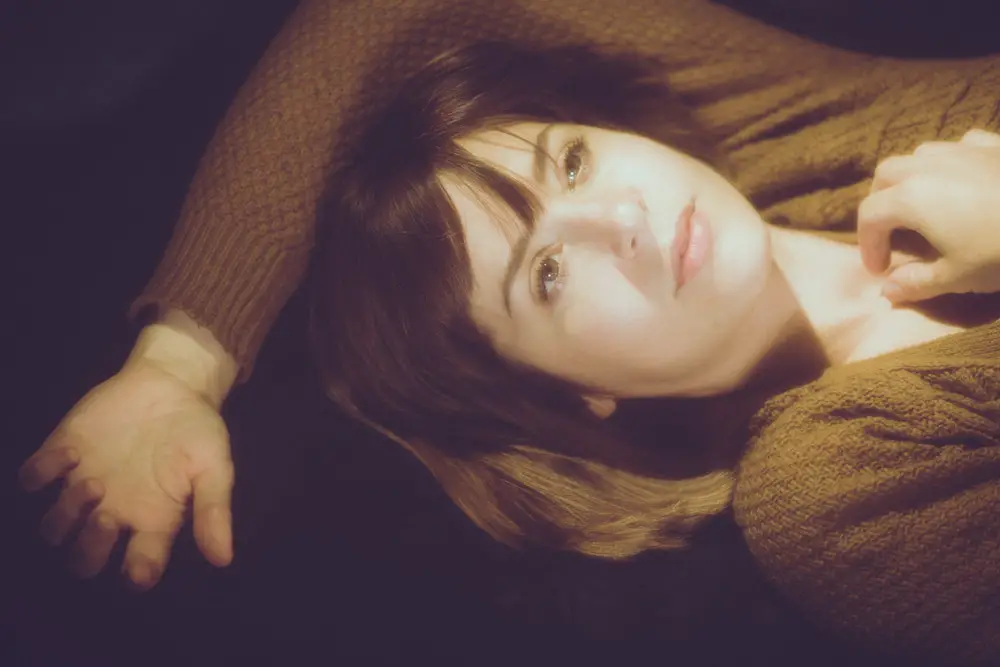
In the vein of that, I’ve always felt like, even outside of lyrical content, your music has always sounded very nostalgic and very wistful. I’m just wondering from a purely musical standpoint: is that a conscious structure of your writing? Or, I guess, just the chord progressions for me, have that heartache thing. And I’ve always wondered how you approach that aspect of things.
Stevenson: Oh, hm! I don’t know. I definitely don’t think it’s intentional, but it’s cool that it can conjure that feeling in other people. I think that I only have a few cards in my chord playing deck, you know what I mean? Most of those, it’s the same chord progressions and I’m just throwin’ a capo on the guitar and say, “Okay, this song’s in…D!” But like, yeah. I’m not very good at writing complicated songs. I think maybe that’s why it feels easy to relate to, melodically. ‘Cause I got four, maybe five, so we’re just gonna throw ‘em in an arrangement and see what happens (laughs).
That’s what I’ve always loved about it, though. It doesn’t have to be complicated. Just sometimes that movement from the major to the minor chord is just so...satisfying.
Stevenson: Cool. I do love like, three majors and a minor, because that’s like, the way life is. A lot of times there’s more minors than majors, but nothing can be purely three chords, happy song. You gotta throw in a minor chord maybe in the bridge (laughs).
I wanted to ask about the first song, “Lay Back, Arms Out.” I just love that melody so much.
Stevenson: Aw, thank you.
It feels like a beginning. I’m wondering: Why did you choose to open with this one? Was this always intended to be the first track?
Stevenson: It was not always intended to be the first track. I thought “Value Inn,” which is the second song, was going to be the first one. I thought, “Here we go, here’s what this record is.” But that’s not really what this record is, and like, that was going to be the first single, but I thought, “That’s not really a good representation of what the record is.” There is a lot more floaty beauty, you know, than just this dark, stark thing that “Value Inn” has. I think, in terms of that, that wasn’t a good introduction into it. People might just be like, “You know, nevermind, I don’t wanna listen to this fucked up…whatever.” I think that it [“Lay Back, Arms Out”] kind of encompassed a lot of the themes, and I don’t know! It just made sense after the fact. But never before was that my plan at all.
Cool. Speaking of “Value Inn,” it has such haunting and specific imagery -- and not necessarily to make you talk about a bunch of heavy shit, but I would just like to know a little bit more about that song, because there’s so much going on in it.
Stevenson: Sure, yeah. That song…well, I wrote a thing and put it out about self-harm stuff last week…Tuesday, I think? It was actually supposed to come out on the Monday. Did you see the article?
I didn’t, actually.
Stevenson: Oh, ok, well it might help to contextualize what I’m about to talk about, so feel free to read it. It says it in more concrete terms, what I’m about to dance around with you on the phone conversationally (laughs). It was supposed to come out on President’s Day, and the website shut down four minutes after they released this article that I wrote, so then they released it the next day, and I had therapy that day, like, “Aaahhh, I don’t know if I want to talk about this today, at therapy, I don’t know how I feel about it.” So I didn’t talk about it, but the next time, I said “Hey, this article came out,” so I sent it to my therapist and she was like, “Oh, shit. Alright, cool.” That song’s basically about this cycle of self-harm that I’ve been in silently for a really long, long, long time, and also is just about not taking care of yourself, or being kind or gentle because you don’t know how. And also, that song’s pretty much about being the mediator, people-pleaser, codependent person that’s in my family, like, “I gotta hold all this shit together, so I’m never going to talk about how fucked up I am,” and then like I’m falling apart in the meantime (laughs). So yeah, that’s also what that’s about. Yeah, a lot of heavy shit, but again, this was kind of like a reckoning for me. It was like, a little bit of a manifesto when I was writing it, like, “If I start talking about this, maybe this will be the step towards change that I am currently for real working on.”
Yeah, that often is such a first step. I have the same experience with poetry for a lot of things.
Stevenson: Cool, yeah. I think saying it or seeing the words on a piece of paper is a huge step, totally.
What would you say is your favorite song on this record, and why?
Stevenson: Uhh, I really like “Value Inn.” I think that for me was, I don’t know, the biggest growing song for me. I think also the last song, I really love. I think I love that song melodically more than anything else. And the song “Hum,” I really love. When I wrote that song – that song’s old, like really old. Before my last record, so probably 2014, maybe. I wrote that song and the song “Low, Slow” and then I had my friend Jeff, I asked “Hey, can we just record stuff, just so I can have it down?” ‘Cause I didn’t have good microphones, and he said, “Alright, cool!” So we did those two songs. I was just fucking around with those songs for years, figuring out when and where to put them out and so they just made sense on this record. “Hum” I really love because when I was writing it, it was just an easy song to write. And those ones always feel like the most natural to me, because it’s like, “Alright, here it is, that was quick.” You know when it’s like – you’re a songwriter, right?
Yep!
Stevenson: You know when you feel like – and this is so stupid, I’m not trying to say that anything I make has any value at all –
It does.
Stevenson: Aw, thanks. You know what I mean, like when you’re kind of given a song? Not saying that I’m getting it from any sort of muse or anything, but when a song just happens, and it’s like, “I feel like it was happy circumstance that all points connected at this specific moment and that’s why this song got written.” I was feeling just the right amount, maybe my hormones were just a certain way…Everything chemically and in terms of time made sense, like, “I’m here right now, and I wouldn’t have been able to if I was sitting down five minutes later.” It was just one of those.
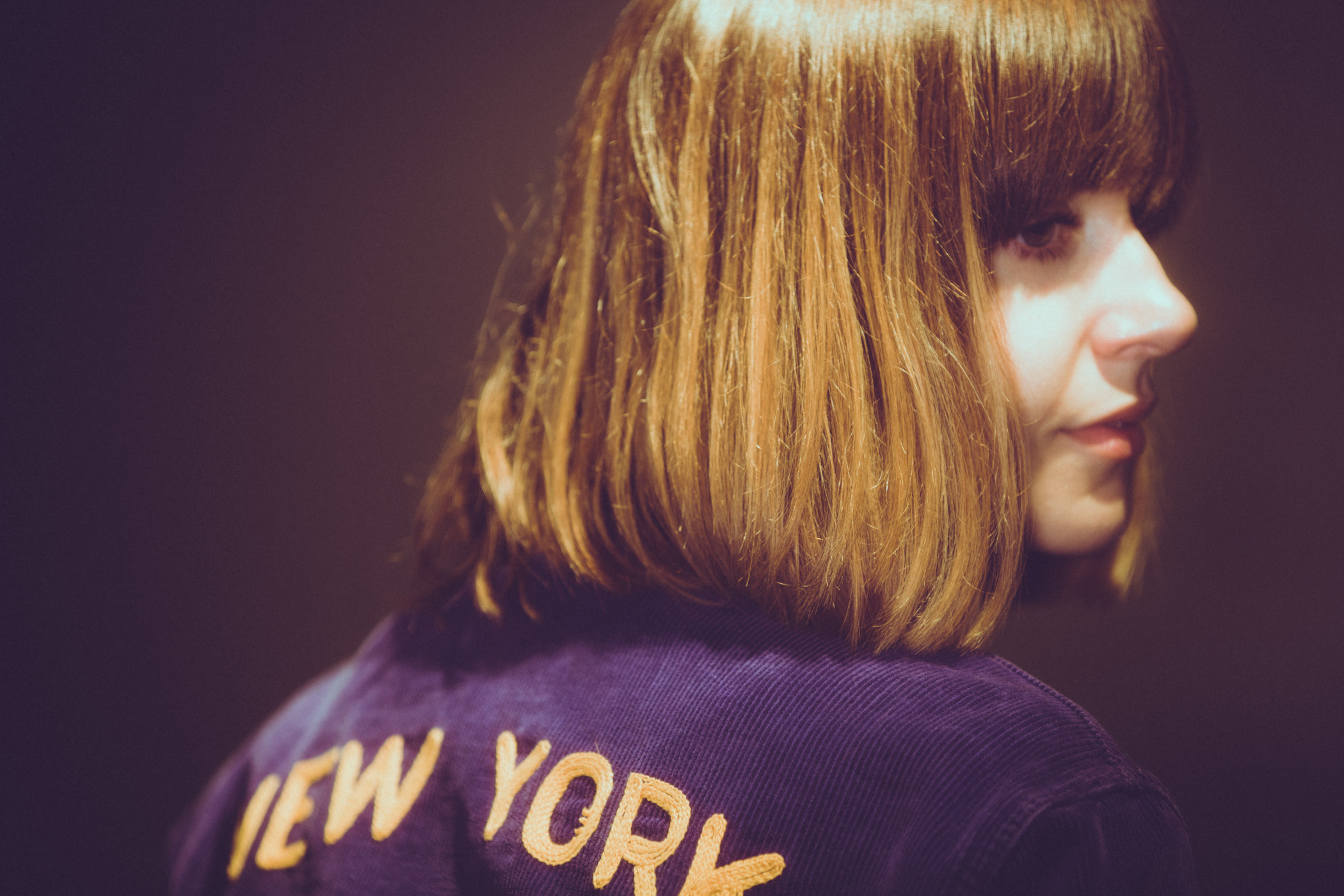
You put out two singles in December, “The Mystic & The Master” and “Maker of Things.” I know they’re out during this album cycle, so do you feel that they still tie in to the overarching narrative of this piece of work?
Stevenson: I think so. I could kind of encapsulate them in the past in a way that was less so like the other songs. The other songs felt like this moving present, sort of, but those two were just like, “I’m looking back at this.” That’s kind of why I launched those two together, plus they were just heavy and crazy, so I said, “I’m not putting those on the fucking record,” and so like, those were never going to see the light of day. I recorded them with everything, it was all done at the same time, so I was just like, “Nope!” But before Joe from Don Giovanni and I ever talked about releasing the record, I was just like, “2018 has been a fucking horrible year, just personally and globally, and everything’s so fucked up. I just want to put these two songs out and give it to charity and feel like maybe it could help people.” They definitely focus on domestic abuse, and they’re heavy. I wanted them to maybe be helpful, and if not, then financially helpful to a charity that I care about, so I just did it.
And what was the organization that you donated to again?
Stevenson: Safe Horizon, they’re great. So, I don’t know, I just felt – whatever. That was a moment of me just being like, my mom’s birthday is five days before Christmas. Christmastime is always my favorite time of year. It’s either the best or the worst, and it’s kind of those two things for me. Every year I think “What the fuck is going on?” But I was just feelin’ like it (laughs).
What has always struck me about your music is that each album feels very distinct from the others. Cocksure was a lot heavier, more rock- and punk-based, and this one feels so much more insular. Let’s talk about your larger writing process: How do you find these albums come together thematically?
Stevenson: I don’t know, because I never consciously sit down and say, “I’m going to write a song about this, and this is going to make it onto this thing that this is all about this.” I kind of piece together the things that make sense, and usually the things that make sense are the best things. Because at this time in my life I’m going through x shit, so all the y and z songs are not really about the shit that I’m mostly going through, so I’m targeting my energy towards the shit that I really care about, I guess. So that’s how the themes kind of converge, I suppose, and the songs are just like, “Oh, this song’s about nothing.” But then sometimes the songs about nothing make it onto the records. Like “Torch Song,” which is on Cocksure…I just wrote a song about legitimately nothing. I just wanted to write a car song and then I said, “Oh this song is really catchy, I guess I’ll record it.” I feel nothing when I play that song (laughs), and it made it onto the record! So I guess sonically it made sense, but thematically it was like, a throwaway song. Which I try not to do, ‘cause if my heart’s not in it, it’s not going to be on the record, but that one made it.
I’m thinking back to your earlier stuff, and it isn’t necessarily something where you sit down and say, “Well this is going to be a rock album or folky album,” because I remember thinking that Wheel had this almost more...bluegrass feel? I just really appreciate that your records are very distinct from each other.
Stevenson: Aw, thanks. I mean, I just love so many kinds of music. I go through phases where I listen to The Cure everyday, or I listen to – whatever. Whatever I’m probably listening to most is going to filter its way into my mind when I’m writing. And I grew up on so many different types of music, so we’ll see what the next one’s gonna bring.
That actually ties really well into a question I had for later, but here we are. Putting a spin on the “Who are your influences?” question... based on what you just said, what musician or musicians do you feel have influenced your work in ways that you wouldn’t have expected, even if their style is completely different from yours?
Stevenson: Oh, that’s a great question. I don’t know. This one’s weird, but I was thinking about it the other day. And I in no way want to say that I am as skilled as he is, in any possible scenario, because he was so great as a writer, but I think a lot of the internal rhyme in phrasing that Notorious B.I.G. does? I feel like that is really inspiring to me. I was thinking about it the other day in terms of other writers that do internal rhyme scheme, and I was like, yeah obviously he’s the best at that (laughs). But yeah, I mean he was amazing. I’m trying to think of anyone else.
You could always talk about musicians that you grew up loving, too, I’m always curious about that.
Stevenson: When I was a kid, obviously I loved The Beatles, ‘cause that was like the children’s music at my dad’s house.
Same!
Stevenson: The Beatles played a huge part in, like everything, for me. But I loved pop music, too, when I was little. I was just listening to ABBA yesterday, and dancing around my house. I just loved sugary pop, even though ABBA is a lot meatier than sugary pop, but I loved Ace of Base, too. But he’s fucked up now; I just read an article about them. One of the guys is a neo-Nazi. Just like, God dammit. So maybe we don’t talk about Ace of Base. You know, just like…I loved Color Me Badd. That was a really insane boy band from the 90s. I just loved everything! I loved grunge music, obviously. I bought In Utero on tape when I was in fifth grade, ‘cause this boy in the gifted program with me, Chris, was like, “Oh my god, Kurt Cobain is so cool,” and I didn’t have cable, so I didn’t know, and my older sister only liked Janet Jackson. My sister loved pop music but didn’t like rock n’ roll, and I feel like a lot of kids learned from their older siblings, especially the kids that didn’t have cable. So I had no idea who Nirvana was, and I kind of had a crush on Chris, and I needed to find out who this band was, so I bought In Utero. I listened to it every single day, and that was my first introduction to Nirvana. And obviously Green Day and whatever, and then I discovered actual punk rock underground scenes when I was in middle school and high school, so that was my whole world.
I know you’ve been a longtime collaborator of Jeff Rosenstock and the members of your band. How do you feel that this collaboration and musical community has impacted your career?
Stevenson: I mean, that was the only reason I’m playing music. Had I not started in the DIY scene, I would not have pursued this, because I didn’t even want to do this. I wouldn’t have done anything, really. I was just writing songs and my friends who were musicians were encouraging me to share them. The person I’m married to now said, “Make a record,” and I made A Record. And then I just continued to make records. I wouldn’t have done this, especially if I was just somebody – I don’t even know how you would start playing music if you weren’t starting small and doing it yourself, would you just go on The Voice? I don’t know! But I wouldn’t have done it. I would just have a normal job, probably, and never would have nurtured this thing, and I’m really grateful for it. Because, I don’t know. I definitely wouldn’t have done it.
I remember downloading your and Jeff’s albums from Quote Unquote Records, which as a broke high school freshman, meant so much to me. Looking back, how do you view this kind of platform and contextualize it within that period of music-making? Just the DIY scene of the mid-2000s, I guess.
Stevenson: Yeah! I mean Jeff was such an innovator in terms of understanding that people are going to access music no matter what, because that’s people’s right. It’s something that you’re allowed to consume and listen to. And the people that want to do that are – not everybody is rich and can pay $15 for a CD or whatever the fuck it used to cost. CDs used to be insane. I remember being able to buy one CD a month. It was crazy! And a lot of people that are trying to discover new music are younger people who don’t have jobs and are in high school, whatever, I totally get that. I came from such a mixtape culture with my friends, where one friend would have a CD and make me a copy on tape, and I would do the same because you wanna be able to access this thing, and you can’t.
What Jeff did was really, really, really cool, and then everyone followed suit and now music is free everywhere and streaming. They’ve found a way to monetize it and not have the ability to give directly to the artist. You’re just giving them a fraction of a cent and all the money’s going to – I don’t even know how Spotify and all that shit works. I don’t know who makes money, but good for them, I don’t know (laughs). I think it was really cool to be a part of, and I don’t think anybody would’ve listened to me otherwise, because they wouldn’t have been able to find out who I was. I was playing basements for years to like 20 people, so it really helped people share what they cared about. If they cared about A Record, they’d share the link. And if you wanna give this person two bucks, go for it. It was cool.
I remember the first time I’d heard you was – I was a freshman in high school and this cool senior friend that I had, she made this mix CD that she gave to our friend and it was like you and Jeff and all these people, and she took us to that show at the record store in Chinatown and that was – I’m gonna sound like a huge cheesy nerd right now but, I heard you play “Beets Untitled” and I was like, “Oh my god!” I used to play that song on the piano all the time. I love that you guys were a part of that kind of world, that for the young musicians that we were, trying to be in shitty garage bands, it was cool to have people like you guys to look up to.
Stevenson: That is really nice, thank you so much. And also, how did you get a friend who was a senior? That’s cool!
I was a band kid, and we played percussion together, and now she’s in a whole bunch of cool bands.
Stevenson: Very cool. I definitely was not friends with any of the seniors. That really is very, very sweet, and that really makes me feel very good. Even when I was a freshman in high school (not hanging out with seniors), I would go to shows and I don’t think any part of me was like, “I wanna be standing up there,” you know what I mean? Maybe it’s because I didn’t feel like I could. So it’s really cool that you are saying that that helped inspire you, that really means a lot to me.
https://www.youtube.com/watch?v=qaISNx3bKpk
My last question – like I’ve made very clear – I’ve been listening to you since A Record, and this album feels very much a synthesis of everything that’s come before, as well as reaching new ground. How do you feel The Big Freeze fits into your career arc? What does this album mean to you?
Stevenson: Well, I think it is probably the most honest songwriting I’ve ever done. Some of the melodies I feel really proud of. I just feel like it’s a nice showcase of maybe how I’m maturing as a songwriter, even though I’m gonna be 35 so saying I’m maturing is like, you know (laughs). I feel really proud of this batch of songs. I don’t know! I think there is a lot of it that has to do with the first record that I made, in terms of going in, basing everything off of the performance, and then piling all the extra parts on top of it, which I did on the first record a lot. I hadn’t done it a lot since the first record. Everything was drums, bass, guitar, then vocals, and it’s like, the song in my mind, even though it’s all the pieces coming together and getting mixed, always felt like everything was in its own little place, and didn’t feel like part of a whole. When you listen back to something that you know was recorded in little tiny pieces, and you’re like, “Oh…ok, so I’m pretending that this is me naturally singing along to these drums, but these drums were just a recording in my ears.” So I think that having it be based on the performance – it was just me and a guitar for everything and I think that that makes me feel really proud of the song and proud of the performance, because I feel like it was an honest version of it. I could just close my eyes and say, “This is how I feel,” and I think you can hear exactly how I feel. I don’t know how anyone else hears it, but when I listen to it, I’m really comfortable with this version of this song.
I guess I actually did just come up with one last question, that brings it back to “Beets Untitled.” I always remember being really intrigued by the lyric in the first verse, “I need to stop singing in code, and start ringing true,” and that’s kind of what you’ve been saying about how your record feels the most honest, and then bringing it back to that first album, feels almost like you have done that – I don’t know what my question is exactly, maybe it’s just a statement.
Stevenson: No, no, I agree, completely. I agree completely. That song, in particular, was the first song about the self-harming behaviors that I was living in. That was the first song I ever played for anybody that was about that. It was like, fucking heavy, but it was also like, “If I write this song, I’m gonna be healed.” And I talk about that in the article. But that song was a huge deal to me, and I was like, “I need to stop hiding from what I really want to say,” and there were a bunch of other songs where I talked about it throughout the other records, where I was a little bit more candid, but still guarded. But now, like, there’s a song on the record called “Dermatillomania.” I’m like, “What’s up! This is my shit!” But yeah, it’s really cool that you picked up on that, because I really was trying so hard to be as honest as possible, just to heal myself. So now I feel like I’m even closer to it. But we’ll see (laughs).
I think that’s all I have for you! Thank you so, so much for talking to me, it’s been really cool.
Stevenson: Thank you, I really appreciate it! And thank you so much for taking such time and having such thoughtful questions, it means a lot to me.
— —
:: stream/purchase The Big Freeze here ::
— — — —

Connect to Laura Stevenson on
Facebook, Twitter, Instagram
Discover new music on Atwood Magazine
? © Rachel Brennecke

